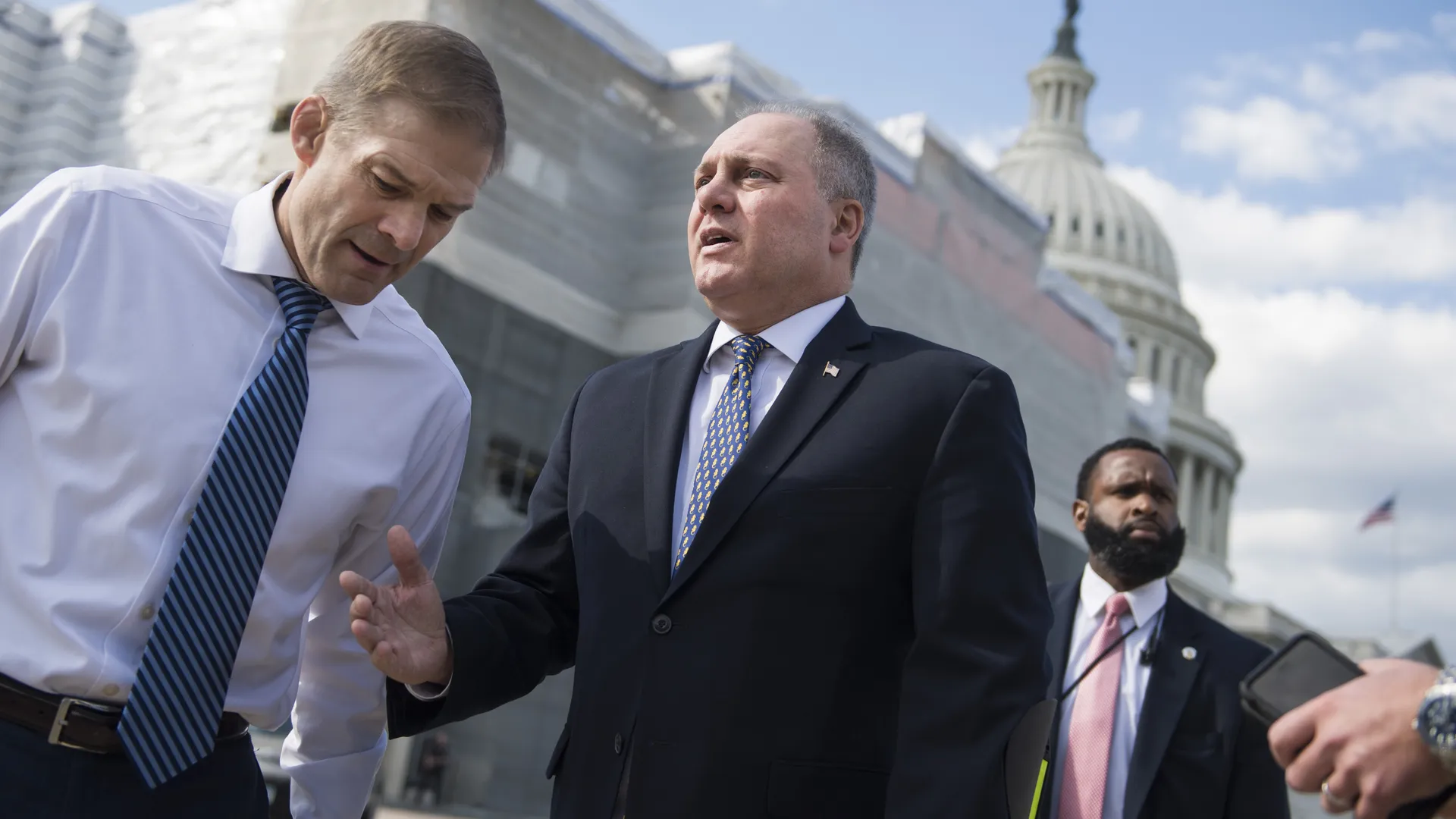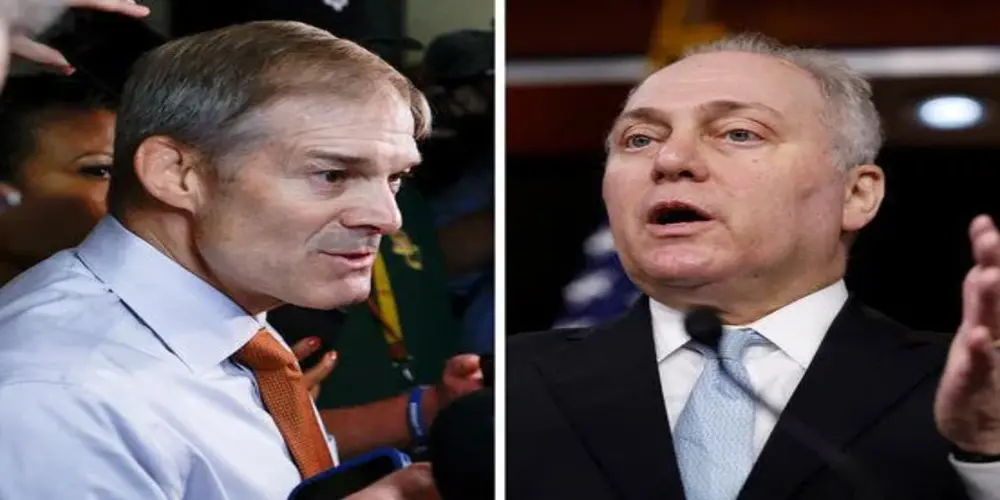In the wake of the Hamas attack on Israel, House Republicans are facing increased pressure to choose a new GOP Speaker of the House swiftly. The urgency stems from maintaining a stable leadership structure during these critical times and addressing issues like government funding and national security.
As they prepare for a conference vote, House Republicans are presented with two strong candidates for the Speakership but lack a clear favorite to wield the gavel. This comes after eight rebel Republicans joined forces with Democrats to oust their previous leader, Kevin McCarthy (R., Calif.).

Reps. Jim Jordan (R-Ohio, left) and Steve Scalise (R-La., middle).
House Majority Leader Steve Scalise (R., La.) and Rep. Jim Jordan of Ohio have emerged as frontrunners in the race for the Speakership. Scalise has secured roughly two dozen endorsements from colleagues since announcing his candidacy. Meanwhile, Jordan, who leads the House Judiciary Committee and enjoys the backing of former President Donald Trump, has also garnered significant support. However, many lawmakers have yet to declare their allegiance.
Fox Calls Off House Speaker Debate After Candidates Reject Plan. Rep Kevin Hern says this is a Republican Family Discussion and not a public decision. I believe he is right. Not all needs to be aired. Fox trying to be credible. They have failed again.https://t.co/tZQm6ChZyM
— MAGA PATRIOT TGM (TERI) (@udreams30) October 8, 2023
Rep. Kevin Hern (R., Okla.), a third potential candidate who chairs the Republican Study Committee, opted out of the race. He emphasized the importance of unity and expressed concerns that a three-way competition would further divide the party. While he refrained from endorsing either Jordan or Scalise, he acknowledged both as capable leaders.
The absence of a GOP Speaker of the House has significant repercussions. It delays crucial legislative actions, including funding the government beyond mid-November. Moreover, it hampers the ability to respond effectively to ongoing international crises, such as the situation in Israel and the fight against terrorism.
Rep. Michael McCaul, the Republican chairman of the House Foreign Affairs Committee, stressed the need for prompt action, citing the precarious state of national security. He emphasized that this is not the time for political games but for swift decisions.
On the Democratic side, House Minority Leader Hakeem Jeffries (D., N.Y.) has engaged with the White House regarding the situation. He reiterated America’s unwavering commitment to Israel’s security. Jeffries called on Republicans to end their internal conflicts and either select a new leader or seek compromises with Democrats.
In the interim, Speaker Pro Tempore Patrick McHenry (R., N.C.) holds limited powers to manage the House until a new GOP Speaker is elected. Following Tuesday’s vote to vacate the speakership, McHenry adjourned the House, allowing candidates to campaign through phone calls and meetings with members who remained on Capitol Hill.
The candidates will present their cases during a closed-door forum on Tuesday, with a potential vote on Wednesday. To secure the party’s nomination, candidates must garner a majority of the conference’s support.
Some lawmakers advocate for commitments from Speaker candidates to revise the rule, allowing any member to trigger a non-confidence vote against the GOP Speaker. They view this rule as perpetually endangering the Speakership and party unity.
Once nominated by the party, the selected candidate must secure a majority of the full House’s votes to become the GOP Speaker of the House. The process may prove arduous, with some members suggesting that the GOP should not adjourn its party meeting until a vast majority supports the chosen candidate.
Notably, Kevin McCarthy faced challenges during his path to the Speakership. Although he won the GOP nomination comfortably in November with a vote of 188-31, it took 15 rounds of voting in January to convince hesitant lawmakers to change their votes from “no” to “present,” ultimately granting him the gavel. On the Democratic side, Minority Leader Hakeem Jeffries (D., N.Y.) received the party’s votes.
Rep. Ken Buck (R., Colo.), one of the eight lawmakers who supported McCarthy’s removal, emphasized that he would not back any Speaker candidate until Republican leaders devise strategies for reducing government spending. He also advocated for a unified front among Republicans before proceeding to a floor vote on the new GOP Speaker.
Rep. Mike Lawler (R., N.Y.), representing a competitive district, signed a letter urging Republicans not to initiate a floor vote for the next GOP Speaker until a minimum of 218 lawmakers—representing the majority—coalesce around a GOP leader. He emphasized the detrimental effects of proceeding without a unified front.
While McCarthy has ruled himself out as a GOP Speaker candidate, there is still hope among some lawmakers, like Lawler, that he may reconsider his decision to step into the Speakership role again. Some view McCarthy favorably as an effective leader who was unfairly removed from his position.
Rep. John Duarte (R., Calif.) expressed optimism that some Democrats might support McCarthy’s re-election to facilitate the approval of U.S. assistance for Israel in response to the recent Hamas attack. House Democrats could help McCarthy secure the Speakership by abstaining from a future GOP Speaker vote, thereby reducing the number of votes he needs for victory.
As the Speakership race unfolds, Jordan and Scalise claim to possess the qualities required to unite a fractured Republican conference. The party encompasses far-right members advocating strict border security measures substantial spending cuts, and moderate members representing districts won by President Biden in 2020.
Jim Jordan, 59, is known for championing far-right conservative policies and co-founding the House Freedom Caucus, considered the most conservative faction within the House Republicans.
Steve Scalise, 58, is perceived as a conservative with strong relationships across the party’s ideological spectrum. As the GOP whip from 2014 to 2022, he fostered ties with members of diverse viewpoints. His relative distance from the Trump faction of the party might make him a more appealing choice to moderate members in competitive districts.
Ultimately, the GOP Speaker of the House plays a pivotal role in shaping the legislative agenda and advancing the Republican Party’s objectives. This position also carries significant responsibilities, including fundraising for the party, recruiting new candidates, and serving as the second in line to succeed in the presidency after Vice President Kamala Harris.
The upcoming GOP Speaker election will determine who guides the House through critical legislative decisions and negotiations with the Senate and the Biden administration. The stakes are high, and the outcome will shape American politics in the coming years.
The last time the House had to choose a GOP Speaker outside the typical cycle was in October 2015, following John Boehner’s resignation. These nonroutine elections have occurred only five times since 1913, highlighting the significance of the current situation.




